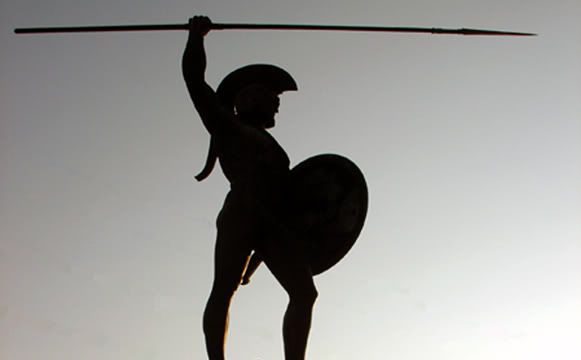
Bloggers whom I respect greatly, Michael Abbott in particular, have over the last few months been registering discontent with the continuing dominance of the shooter—loosely defined as any game in which the primary gameplay mechanic involves shooting a firearm—in the games industry. I share the sentiment, to the extent that I hope that games will keep expanding the range of stories they can tell and facets of the human condition on which they can shed light.
I’m very tired of shooters, myself, having played a great many of them over the last few years—some of them extraordinarily good as vehicles of immersion in tales of death and glory. I want to play more games like Pixeljunk Eden, the wonderful art-game released this week for the Playstation 3. But I worry that we might let our desire for richer games stop us from understanding how important, and how meaningul, shooters are as a sort of baseline for game-narrative.
I say that because of my appreciation of the books of the Iliad that are usually called the “battle books.” In these books, epic heroes kill one another with great abandon and in spectacular ways. Here’s a sample, from Book 4, in Richmond Lattimore’s translation:
Antilochos was first to kill a chief man of the Trojans,It goes on like that, and on, and on, and on. (One analogy with the battle books that I find very compelling is MMO grinding, the game mechanic in games like World of Warcraft in which players must slay enormous numbers of the same enemy, but that’s for some posts down the road.)
valiant among the champions, Thalysias’ son, Echepolos.
Throwing first, he struck the horn of the horse-haired helmet,
and the bronze spearpoint fixed in his forehead and drove inward
through the bone; and a mist of darkness clouded both eyes
and he fell as a tower falls in the strong encounter.
As he dropped, Elphenor the powerful caught him by the feet,
Chalkodon’s son, and lord of the great-hearted Abantes,
and dragged him away from under the missiles, striving in all speed
to strip the armor from him, yet his outrush went short-lived.
The battle books clearly represent a very early layer of Homeric epic—the kind of thing warriors and warrior wanna-be’s would have loved to listen to at a feast. The analogy with shooters like Halo and Half-life seems pretty clear to me. What we might call the expressive range (that’s Iroquois Pliskin, following up on Michael) of this material, whether Iliadic or game-ish, is not great: it consists of various interesting ways in which people might kill other people in battle. What I want to point out, however, is that the meaning of the profound bits of the Iliad (like the ones I’ve talked about before) could not have come into being without the battle books, because it is in the battle books that prowess is defined, and the themes of epic (both the Iliad and the Odyssey) revolve around how we are to understand prowess.
To take it a sort of fundamental step back, playing war is something boys do. Oh, man, did I do it myself. I did it to such an extent that I was convinced, at around the age of 10, that I was going to go to Annapolis and become an admiral. I played with my cap gun, and my ship models; my ancient Greek herdsman must have done it with stick-swords and ships made out of wood instead of plastic; my five year old son does it with his squirt gun, despite the fact that my wife and I have assiduously kept the slightest mention of armed conflict from his ears.
Unless you know what glory is, the idea that glory is hollow makes precisely no sense. The battle books and the dominance of shooters tell me that glory is fundamentally the feeling one gets from annihilating one’s opponents with the coolest possible technology in a culturally-approved situation, and that other versions of it are metaphorical and transferred. Thank God we don’t actually have to kill anybody to become thoroughly acquainted with the feeling, and the notion. Thank God, that is, for the battle books, and for shooters.
Should we have peaceful games like Pixeljunk Eden, in addition to our shooters? Of course. Am I tired of shooters? Of course. But I really believe that the peaceful games would never seem quite so peaceful had I not played so many hours of Halo and Call of Duty.
